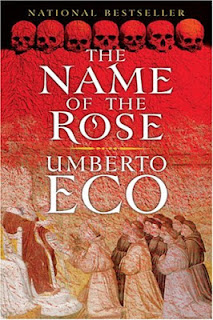It seems that I have a lot of time on my hands. I managed to squeeze in not one, but two books from the 1001 books to read before you die list. This month I didn't read a Novel 100 book, because I had already read the book slated for this month. I recently took a trip to Victoria with a friend and picked up The Name of the Rose by Umberto Eco for $6.99 at a cute independently owned book store called Munro's. I was pretty excited because my boyfriend really liked the book and thought I would too.
What's not to like about a mystery set in a abbey with a labyrinthine library and a secret to keep?? I read this book in no time flat. I have heard that if you can get through the first 100 pages of this novel than the book is for you. Since I didn't even notice that the book was slower at the beginning it must have been tailor made for me!
I liked this novel because I knew absolutely nothing about this period of history. I am fascinated by it however, and have read a few books set in this time period, mostly because of my love of labyrinths. The Labyrinth by Kate Mosse and The Rose Labyrinth by Titania Hardie were my original two novels about monks and the secrecy of this period. Eco does a good job of giving an overview of the historical time period throughout this novel.
Umberto Eco is a Semioticist which is a person who studies signs. I am a fan of symbols and thought this book was brilliant. The book's name, "The Name of the Rose" refers to a quote in Latin which states, "what is left of the rose is only it's name." The book is interesting because it plays with the idea that meaning can be lost easily and that symbols can stop meaning what they once did after repeated use. Even though that is what the novel's end hints at, I still felt like the book was hopeful.
Here are a few quotes from the book on meaning and symbols:
"He was thinking of the endless array of symbols with which God through His creatures speaks to us of eternal life."
"The whole universe is surely like a book written by the finger of God, in which everything speaks to us of the immense goodness of its Creator"
"When we consider a book we mustn't ask ourselves what it says but what it means"
"A book is made up of signs that speak of other signs, which in their turn speak of things"
I love things like that! I am a fan of symbols and I am a huge fan of philosophical thinking. This whole book is just ripe with these ideas while still having an absolutely engaging murder mystery to solve.
Here are some quotes that I loved. Most of them were written in Latin in the book, but thanks to the magic of Google and my love of languages (I actually started to learn Latin while reading this book) I decided to find the meanings of them and boy, am I glad I did:
omni Mundi creatura
quasi liber et pictura
nobis est in speculum
or "every creature on earth resembles a book and a picture like looking through a mirror"
amor est magis
cognitivius quam cognito
"we know things better through love than through knowledge"
"Non in commotione, non in commotione Dominus
"Not in confusion, God is not in confusion"
There is so much I could say about this book, but I think I will leave it at that. Immediately upon finishing this novel I discovered that another Umberto Eco book was on the 1001 list, Foucault's Pendulum. I loved The Name of the Rose so much that I immediately bought the Pendulum on my e-reader and started in on my second Eco book.

1 comment:
I think you and I loved much the same things about this book--you've quoted a couple of things that really struck me while reading. So glad you liked it!
Post a Comment